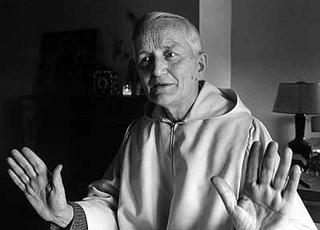
In case you weren't at vespers last night, here's my meditation on Deut 25:13-16. I still have a lot to learn about finding unity in a message, and then not making all these complicated shifts in the message.
Deut. 25:13 "You shall not have in your bag two kinds of weights, a large and a small. 14 You shall not have in your house two kinds of measures, a large and a small. 15 A full and fair* weight you shall have, a full and fair measure you shall have, that your days may be long in the land that the LORD your God is giving you. 16 For all who do such things, all who act dishonestly, are an abomination to the LORD your God.
We find in the Book of Deuteronomy, laws on the grandest scale, as well as those pertaining to the smallest of details. But every Law Moses enumerates from the Spirit of God has the same function: to provide and preserve true life in the land God’s chosen people were about to occupy. From the majestic dimensions of the Tabernacle to the fabric of the tassles worn by the Priesthood, there is no aspect of Israel’s life in the land for which God has no concern. That concern extends even to how people conducted themselves in commercial transactions:
13 "You shall not have in your bag two kinds of weights, a large and a small. 14 You shall not have in your house two kinds of measures, a large and a small.
In our day we stand at a gas pump and assume the measurement of the gas it says we’re getting is true to the amount of gas we’re actually purchasing. Imagine the chaos that would follow were we to discover that we’d been defrauded in our purchase. That’s why you see a sticker on every pump from, ironically, the Bureau of Weights and Measures, certifying its accuracy. Especially now, when gas costs so much, accurate weights and measures are so essential. It is to our advantage to have accurate readings.
For Israel, stability would issue from trust—trust in their Lord and trust in one another. In all things, fidelity. In all things, equity. That’s why two unequal kinds of weights and measures are here unequivocally banned. To purchase grain in ancient Israel, you would place your weight on the merchant’s scale, and he would keep adding grain to his side of the scale until the scale balanced. But if the buyer’s weight was actually heavier than he admitted, the seller would unwittingly place more grain on the scale to offset the difference. In the end, the seller would be defrauded of grain. This defrauding could be practiced by buyer and seller alike. If the seller misrepresented his weight, the buyer would leave with less than what he’d paid for. So the practice of using inequitable weights and measures was for one’s personal advantage. Therefore God outlines succinctly the integrity that must be between fellow Israelites, and then broadens its consequences both positively and negatively.
15 A full and fair* weight you shall have, a full and fair measure you shall have, that your days may be long in the land that the LORD your God is giving you. 16 For all who do such things, all who act dishonestly, are an abomination to the LORD your God
At issue here, of course, is integrity; dishonesty is the vice that threatens a society. But there’s a theme contained herein whose implications far exceed that of commercial interests. It’s the theme of right and true measurement. For Israel, life—true life—would issue from an appeal and a submission to right measure.
So, consider: Each of us brings into the world, so to speak, one kind of measure—a self-made measure of ourselves, our value, our rights. From our earliest days, we consider ourselves to be worthy of finding true and satisfying life in the world. And in our first considerations of God, who doesn’t at first assume we’re worthy of His favor? We tend to see ourselves as essentially good, or at least, unworthy of anything unfavorable to our condition. And even if we don’t intuitively arrive at that conclusion, surely we are immersed in a culture that, like the tide, continually washes over us with the notion that our hearts are just fine, good enough, even untainted. And in that air of positive thinking, we are likewise prone to measure the holiness of God too lightly, or to conceive of it too arbitrarily.
Such is the weight and measure of ourselves we bring to the scales.
Our Lord, however, brings another weight and measure. In Him is the true weight of God’s holiness displayed. Jesus walked the Earth as a sinless Man, showing all who saw Him what God was like in ways no one had seen before. Jesus’ attentiveness to the Father, His confidence in the Spirit, His perseverance through suffering for the glory of God—every step He took meted out to us a little more of the measure of God and the weight of His glory. Add to that His Zeal for God’s name to be revered and His righteousness to be manifested in His people—surely God’s Holiness was of foremost concern, and in Him we feel the true weight of that holiness.
But so, too, is the true measure of our condition revealed. Jesus didn’t pull any punches in His assessments of those He encountered. Among the irreligious, he awakened them to the folly of their pursuits. Among the religious, he warned them even more strenuously of mistaking outward piety for inner holiness. He confronted them. . .and he confronts us at our deepest level, incisively addressing our hearts—dissatisfied with effecting mere behavioral change or slavish mimicry. But why should He be so up front with us? Why call out so unflinchingly the darkness He finds in us? Because He knows who and how we are. He knows the games we play, the lies we tell ourselves, the pretense we cling to, the fear we won’t admit. The longer we cherish our version of ourselves, the longer we live lives out of the balance He means for us.
The Table from which we are about to partake—think of it again as the scale by which God measures several quantities. In the broken bread and the poured out wine—in this, Jesus’ body and blood spiritually represented to us--He places before us how weighty is God’s holiness and how devoid we are of it.
And it is in seeing that disparity between what we have and what God requires that we see the other quantity that brings balance to the scales: His grace. Only love, expressed in grace could supply what was lacking in us. And in seeing that disparity resolved we are nourished—nourished deeply by the Spirit who means to keep us mindful of His holiness and His ability to overcome our lack.
The measure of ourselves we bring into the world we use for our advantage—not unlike the scurrilous Israelite who would seek to defraud his neighbor: the longer I think my version of myself is true, the longer I can think what I deserve is true. Yet, in the end, we must concede that God, seeing all things, shall not be defrauded of His will, or His Justice, or His Glory. The Cross bears that out. The Cross tells us that God would not be defrauded of the holiness He sought from those He created. God’s zeal for equity explains why it took such a radical and costly sacrifice to bring balance and reconciliation between man and God. He would not be defrauded by those who bring faulty and false forms of measure.
So, as you come forward momentarily, think of your approach as placing your weight upon His scale and seeing its utter weightlessness. And as you are handed the bread and wine, think of them as God’s placing the weight of His Holiness upon the scale, and see its immeasurable weigh. And then as you partake, consider the grace He supplies to bring balance to His scale—not only to bring balance, but to bring life. For Israel, rich life had to do with right measurement. It is the same for you today. Submitting to His true measure is the only way to find and enjoy His true life. For it’s in the Grace we receive through this sacrament that we find the life He meant for us. Appeal to His measure. It is to your advantage.











